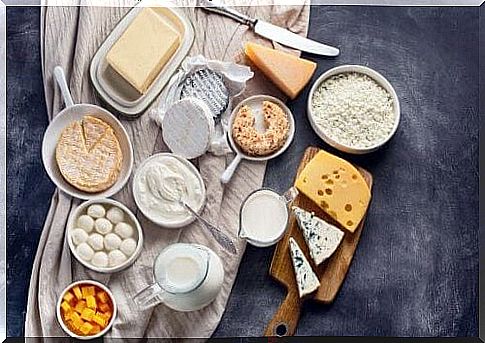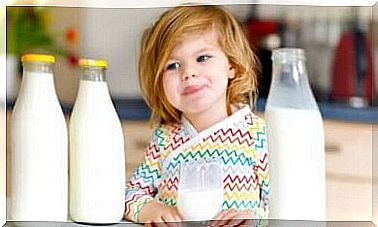Choose The Best Dairy Products For Your Child

We all know how important calcium is for bone development. Consequently, it is also very important for the overall development of children. Dairy products are rich in calcium and other nutrients, which is why it is essential that children over 2 years of age eat half a liter of milk per day. Or, instead of milk, other derivatives are also a great idea. Next, we will find out which are the best dairy products to give to our children.
During the first few months, babies only need to have milk. The best is maternal but, if this is not possible, infant formula will be her only food up to 6 months of life. From this age on, other products must already be introduced for normal and healthy growth to occur.
The best dairy products for children
Milk
The milk, starting from 12 months of life, must be taken whole, or with all the fat component. Babies grow fast, but have small stomachs and have to eat calorie-rich foods. And at this stage, with a few exceptions, cholesterol does not pose a risk. In addition, the fat in milk means that vitamins A and D can be better absorbed.
From the age of 3, it is advisable to consume cow’s milk with less fat, partially skimmed, better than growth milks.
Growth milks are built with semi-skimmed milk and vegetable fats. Sugar or honey is also added to make them taste better, since vegetable fats have the effect of changing the flavor. This can be negative, as it can encourage tooth decay. It also makes babies get used to the sweet taste and no longer want regular milk.

Yogurt
Yoghurts can be given from 6 months, but it is much better that they are not consumed by children up to one year of age due to the protein content. The best option is natural yogurts, since they contain neither sugar nor sweeteners. This way they won’t get used to the sweet taste, as well as reduce the risk of tooth decay.
Cheeses
Cheese can be offered to babies from 12 months of age. It is recommended to start with fresh and tender cheeses. Furthermore, we must make sure that they are made from pasteurized milk, to avoid the risk of certain diseases that can be contracted through the consumption of cheese made with unpasteurized milk.
Liquid dairy products
Dairy products to drink are very popular, such as “Yomino” or “Danonino” to name a few. But with these liquid yoghurts, added to yoghurt, milk and cheese, children risk getting too much protein. In addition, these dairy products were tested and found to have a very low quality fat content, so they would be recommended at most once a week.
Puddings, creams, mousses and other sugary desserts
These packaged products should not contain eggs, according to the traditional recipe, but still contain thickeners, sugars and dyes. These are not yogurts and they are much less healthy than these. They have a high sugar content and should not replace a glass of milk or natural yogurt.
If we want our children to eat puddings or creams, the best thing is to prepare them ourselves with the ingredients we have at home. Making them at home will be much healthier than those you buy at the supermarket.

Children’s calcium needs
The recommended daily amount of calcium varies according to the age of the child. Here we leave you some data about it:
- Children from 1 to 3 years: 700 mg / day.
- Children from 4 to 8 years: 1000 mg / day.
- Boys and adolescents from 9 to 18 years: 1300 mg / day.
To reach these values, it is recommended to consume 2 or 3 servings a day of milk, yogurt and cheese. Recipes containing milk derivatives can also be used to cover calcium needs in children.
Final thoughts for choosing the best dairy products
First, don’t assume that everything sold in stores and supermarkets is healthy. You have to pay close attention to the ingredients and nutritional composition and, in case they are not acceptable, decide to prepare the different foods at home. So that we can offer our children the best possible dairy products.
Secondly, children should not be saturated with dairy products. After all, there are also plant-based alternatives that not only have good nutritional value, but are also easy to digest.
Finally, it must be borne in mind that, even if the glass of cow’s milk has become an icon in the collective memory for “growing healthy and strong”, what is most important is to maintain a balanced diet. All food groups must be present in this, each in the right measure.









